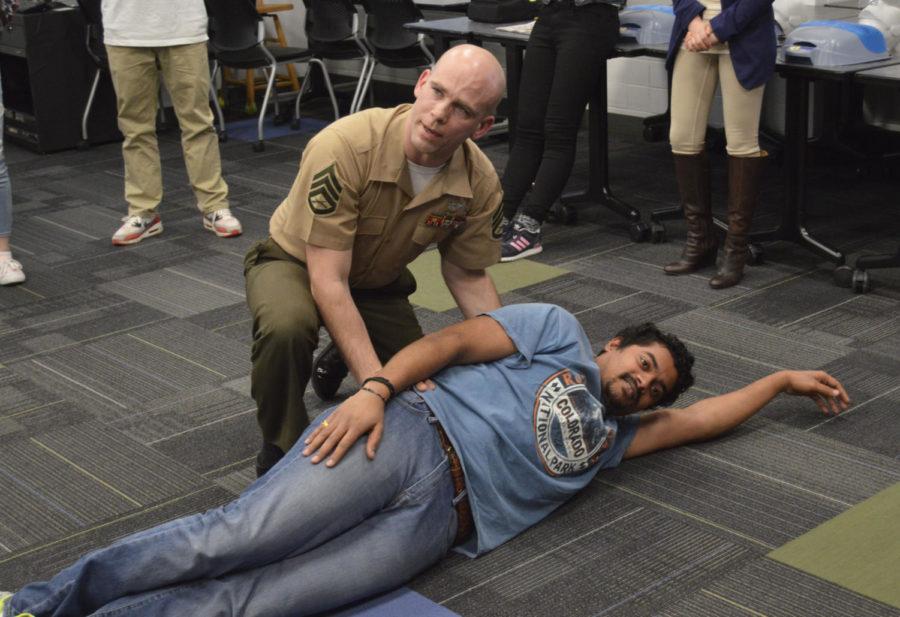International students learn how to manage emergency situations during first-aid training
Staff Sgt. Chris Harrison used Sunny Mahajan, graduate student in civil engineering, to demonstrate the proper way to treat a victim who may have an air blockage. U.S. Education Without Borders and Naval ROTC sponsored the first aid and leadership training session for international students Tuesday afternoon in the Armory.
March 11, 2015
Hold the head, plug the nose, two breaths in to the lungs and 30 chest compressions. Those are CPR instructions down to their most basic, but they may save a life.
That is why U.S. Education Without Borders and the Naval ROTC provided a first aid training session for international students at the Armory on Tuesday.
This was the first time the USEWB has worked with the ROTC programs, said Swallow Yan, president of USEWB.
The participants were not all students from Iowa State. Some came from Drake University and the Des Moines area to take the course.
The session included demonstrative and inspiring videos from the Red Cross and was led by Staff Sgt. Chris Harrison, assistant marine officer instructor at the Navy ROTC.
Throughout the session, students learned how to be more confident in an emergency situation, which is something everyone has in common, Harrison said.
Students learned about what constitutes a dangerous situation, how to get help and were able to practice CPR and use an automated external defibrillator (AED). However, the course was intended to do more than just teach students tactical skills.
The main focus of providing the event was to create interaction between the international students and the military we have on campus, Yan said.
Interactive training and guided discussion were a main part of the course, as students were able to work with partners and discuss the material they were learning. Students were also able to discuss the material with Harrison, who is certified to teach the course.
As the class began, Cmdr. Daniel Buhr, executive officer of Naval ROTC, highlighted the critical importance of interaction during the course to learn the different cultures, including military culture, that were represented.
People from China, India, Colombia, Saudi Arabia and others participated in the course.
“When something happens, I can help myself and help other people [in an emergency], and get to know some people,” said Yuegui Su, who is an exchange scholar from China studying agronomy.
Along with the basic training students received, they realized the implicit benefits of the course, such as interacting with others.
“We wanted to find someone to present excellent leadership training and the best person would be someone who came from military,” said Larry Lan, program coordinator for USEWB.
Lan, in coalition with Sgt. Harrison, was able to organize and provide the successful program to help international students learn valuable skills and knowledge.
“They’re going to take something away from it that’s very tangible,” Buhr said.
USEWB provides many events for international students to learn about the culture that surrounds them in Iowa and the United States, offering many opportunities for the students to meet new people and gain new knowledge.
Sunny Mahajan, graduate student in civil engineering, said that he has done courses like this before and thought this class would be very helpful to him and others.
“Everyone, regardless of where you are and what you’re doing, there’s always some type of emergency that can come out of it,” Harrison said.
International students were able to meet new people and learn about other cultures while learning a valuable, realistic skill throughout the course.

















